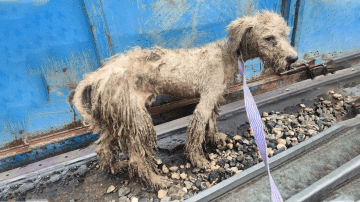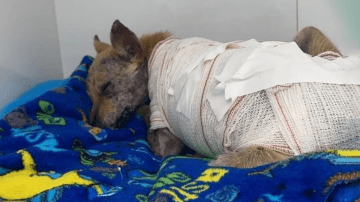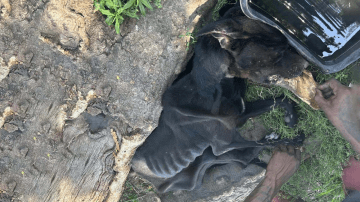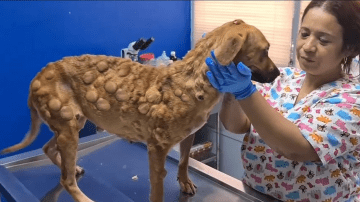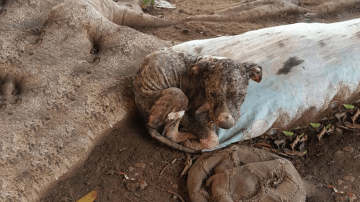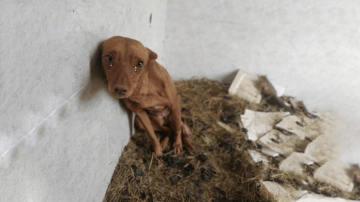She was chained, neglected, and utterly heartbroken. No dog deserves to live such a life, yet here she was—lying in the scorching sun, her once-golden coat dulled and her spirit crushed. The call had come from a concerned neighbor who could no longer bear to watch her suffering. The rescuers had braced themselves for the worst, but even their warnings had not prepared the team for the reality.

In a sun-baked courtyard, a Golden Retriever lay chained to a post. Her belly was grotesquely swollen, far larger than the shallow basin of water left beside her. The water itself was dirty, undrinkable, and the small enclosure reeked of filth. She had nothing—no clean food, no care, no comfort.
When the rescuer knelt beside her and gently lifted her head, he whispered, “You’re not alone anymore.” His voice trembled, heavy with emotion. Her body told its own story—covered in open wounds, scarred from neglect and abuse. Beside her was a dish filled with sour chili scraps, hardly food for any living creature, let alone a suffering dog.
As the team began to assess her situation, the owner stormed back into the courtyard. His voice was sharp, defensive, dismissive. The poor dog turned her head away in fear at the sound, shivering from memories of cruelty. When confronted about her condition, he simply shrugged and claimed, “She’s not sick, just pregnant.”
The rescuer’s heart sank. He had seen suffering, but this… this was not pregnancy. He said firmly, “This dog is sick. She needs medical attention right now.” But the man scoffed, crossed his arms, and sneered. “If you want her, you’ll have to pay. Three hundred dollars.”

The rescuers exchanged frustrated glances. They couldn’t walk away, but the demand was outrageous. Reasoning with the man led nowhere—he only grew angrier, even hurling a bottle toward the helpless dog in a fit of stubbornness. Afraid for her safety, the rescuer made a decision. He agreed to pay $150, an amount he could barely afford but would sacrifice without hesitation. “We’ll take her,” he said, his voice resolute.
The owner smirked in triumph, but the rescuers ignored him. Their focus was on the trembling Golden Retriever who, despite everything, had endured silently. They carried her carefully into their vehicle, determined to save her.
At the animal hospital, she was too weak to walk. They lifted her gently and laid her on the examination table. The veterinarian’s eyes widened as he saw the distended belly. Without delay, he began his examination and ordered tests. Moments later, his diagnosis broke the rescuers’ hearts.
“She’s suffering from severe ascites,” he explained softly, “a condition where fluid builds up in the abdomen. Her legs are swollen with edema. Her condition is critical.”

The rescuers swallowed hard. “What are her chances?” one asked, barely above a whisper.
The vet’s face softened, though his words carried the weight of uncertainty. “We’ll do everything we can. But it will be a tough battle. She’ll need immediate treatment—regular drainage of fluid, protein therapy, antibiotics for her wounds. For now, we’ll start an IV to stabilize her body and prepare for the procedures ahead.”
The rescuers nodded, determination in their eyes. “Do whatever it takes. She deserves a chance.”
The next morning, the team anxiously awaited the test results. The veterinarian held the papers in his hand, his expression grave. “Her albumin levels are dangerously low—only sixteen, when they should be at least twenty-four. This lack of protein is worsening the swelling in her abdomen and legs. Her back legs are swollen from edema, likely due to fluid retention and poor circulation. And she has an infected wound caused by filthy living conditions. She’s been suffering for a very long time.”
Silence filled the room. Finally, the vet added, “Her prognosis is poor. It’s advanced. But if she’s eating, there’s still hope. We’ll drain the fluid gradually and support her with albumin therapy.”
As the nurses prepared the procedure to drain her abdomen, the rescuers held their breath. The dog, though frail, remained calm. She did not growl, did not resist. Even as the needle pierced her swollen belly, she lay quietly, as if she knew they were trying to help. Her quiet bravery moved everyone in the room. When the nurses cleaned her wounds, she continued to trust, never once showing aggression. “She’s a fighter,” one rescuer whispered.

Day after day, the team stayed by her side. They wiped her gently with warm water, fed her soft pieces of chicken to restore her strength, and whispered words of comfort. Too weak to stand, she devoured her meals with surprising eagerness, showing them she wanted to live.
It was then they gave her a name: Jinni—because she was a miracle waiting to happen, a spirit of resilience who deserved her chance.
With time and care, Jinni began to respond. She wagged her tail faintly when the rescuers arrived each morning. The vet encouraged them to help her walk, however weakly, to reduce swelling and improve circulation. At first, her legs wobbled and nearly gave out, but with gentle encouragement, she managed a few shaky steps. Each step was a triumph, each moment a reason to hope.
Through repeated treatments—draining fluid, providing albumin, antibiotics, and better nutrition—her body began to heal. Though she still trembled during procedures, she never resisted, her calm strength astonishing everyone who cared for her. Nurses and doctors alike praised her courage.
As days passed, her appetite remained strong. She devoured her favorite boiled chicken, wagged her tail more often, and even leaned into the rescuers’ touch when they cleaned her ears. Little by little, the fearful, broken dog they had first seen was transforming before their eyes.
By the seventh day, the swelling in her legs had reduced. Her abdomen, though still large, was easier to manage with repeated drainage. On the tenth day, she was strong enough to leave the hospital for outpatient care. Though she still required close monitoring, her resilience was undeniable. She nuzzled close to her rescuers, her eyes glowing with gratitude.
Weeks passed, and Jinni’s progress continued. Her once-dull coat began to shine, her hollow eyes sparkled with vitality. Her abdomen, once distended and grotesque, had shrunk to nearly half its size. The swelling in her legs subsided completely. She could now stand and walk across the yard, her tail wagging freely, her steps confident.
Two months into her recovery, Jinni was unrecognizable. She had transformed from a frail, neglected creature into a radiant Golden Retriever, full of spirit and life. Her coat gleamed, her body was stronger, and her eyes radiated joy. The dog who once lay chained in filth now ran across the grass, basking in the love that surrounded her.
Jinni’s story is not just one of rescue. It is a testament to resilience, to the quiet bravery of animals who endure unimaginable suffering yet still choose to trust. It is proof of the power of compassion, the way love and care can bring even the most broken back to life.
From despair to hope, from chains to freedom, Jinni’s journey reminds us all of one simple truth: every life is worth saving.

